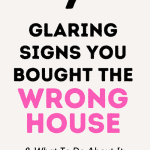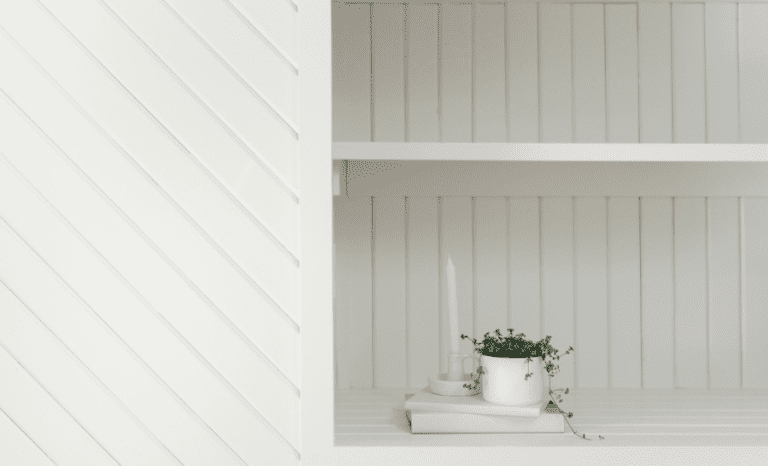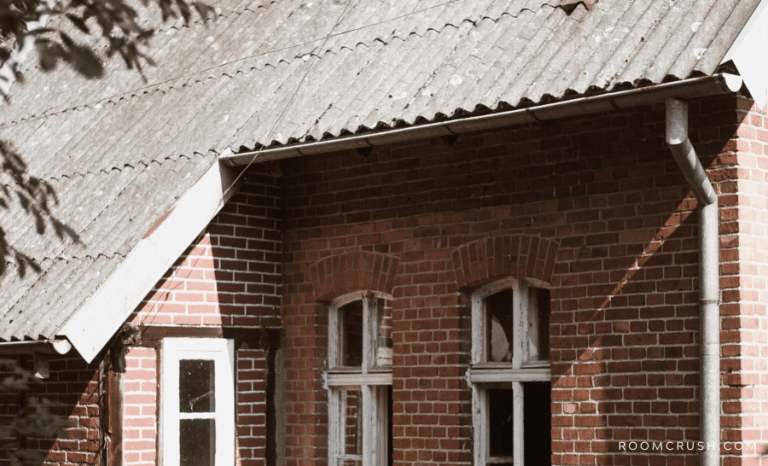7 Glaring Signs You Bought the Wrong House [And What To Do About It]
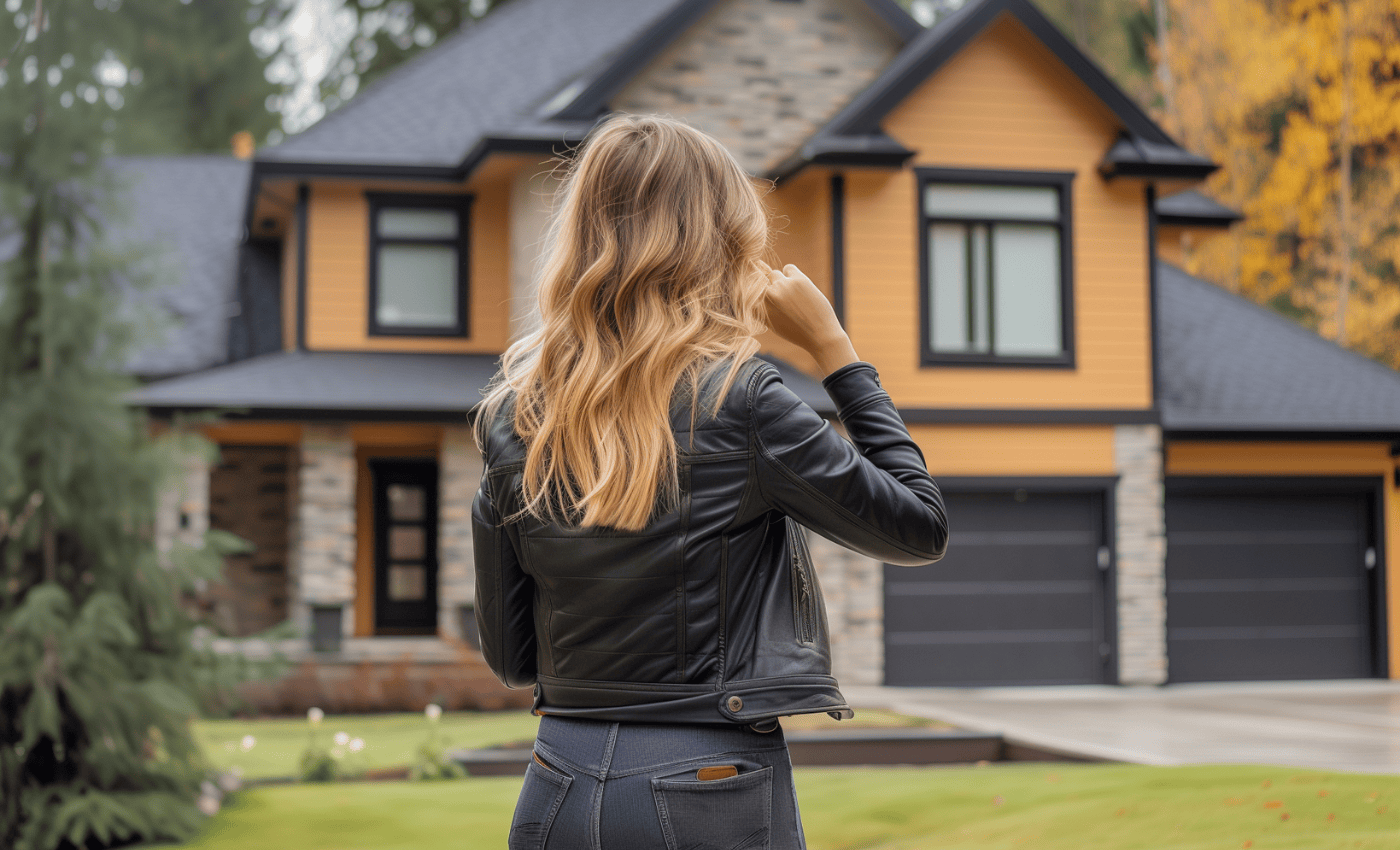
There’s a lot of excitement when moving into a new house. You get the keys, move in all of your stuff, and maybe get new furniture.
Everything is new (or at least new to you), and it’s fun to show off your new space to family and friends.
But sometimes, you’ll notice another feeling instead of happiness…concern. Something isn’t quite right, and you start to wonder if you made a mistake.
Here are 7 signs you bought the wrong house, and what to do about it.
This site uses ads and affiliate content as an Amazon associate earning on qualifying purchases. Disclosure.
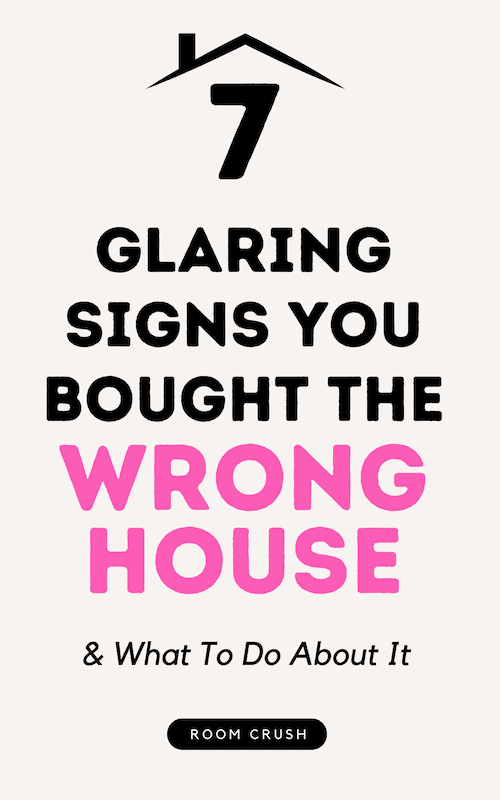
Is It Normal to Regret Buying a House?
To an extent, yes. A big purchase can lead to buyer’s remorse, which means regret after purchasing something very expensive.
You may wish you still had the money instead of the thing you bought. A lot of people do feel like they made the wrong decision after buying a home.
This could be stress from spending so much money, but if you experience the following warning signs, it might be more than just simple regret.
Just Bought a House and Everything is Breaking
Maybe you love the look of the house and the number of bathrooms, but then you move in, and things start to go wrong. Very wrong.
The sink leaks, the toilets flood, the patio stairs begin falling apart, and several windows suddenly won’t close properly. This is a sign that the house may have had problems you didn’t realize when buying it.
This can be pretty frustrating. After all, you just spent a lot of money to buy the place, and now you’re having to do maintenance work on a home that should have been in good condition.
If everything is breaking in your new home, there are a few things you can do. First, if the house is brand new, it will probably have a builder warranty.
If so, you may be able to get some things repaired for free. If the home was owned by someone else before you, find out what was disclosed correctly before they sold to you and whether the seller has any responsibility for this. The rules vary.
How Do I Know if I Bought the Wrong House
Buying the wrong house is a problem, but it can happen to anyone. Sometimes the issues surrounding a home are simple and easy to correct.
Other times, they’re a bit more complicated. You may not discover you bought the wrong house until after moving in and living there for a while. Or it could happen right away.
Here are the 7 glaring signs you bought the wrong house. Plus, the correct thing to do if the home isn’t what you expected or want.
1. Structural Damage
Structural damage is a big concern with houses. It involves the roof and walls of your home.
If you notice issues like cracks or gaps anywhere or floors that are not level, your home may have structural damage. The structure of your house is essential for your safety.
If the seller did not inform you of this damage, you should speak to a lawyer regarding possible legal action.
This is something to look out for when you walk through the house before purchasing it. Try to notice cracks and gaps, if any are present because it can be a challenging problem to fix.
2. Location
Everyone knows how much location matters with real estate. And problems can arise if you realize that you didn’t buy a home in the right place.
In some cases, a new location may simply require an adjustment to a new schedule. If you are further away from work than before and the commute is too long, consider alternate routes or heading to work at a different time of day to beat traffic.
Or perhaps your new home is further away from family and your social circle than you’d prefer. Instead of focusing on the negative, use this as an opportunity to expand your horizons.
Meet new people, join a new gym, and host family gatherings at your home to avoid the commute. Exploring your new neighborhood can help you feel more at home, as well.
You may also realize that what you thought would be a good thing, like proximity to major shopping centers or the highway, is actually a problem when you move in. It could be noisy and busier than you thought.
It’s essential to check out your new home’s location before moving in if possible to avoid this. But maybe the location is a problem in a different way.
Perhaps you realized after moving in that your neighborhood is not as safe as you thought. If crime is on the rise and you have safety concerns, that’s a different matter.
You can install security cameras and get a dog to help with protecting your home. But if that isn’t enough, you may need to check out the housing market for other, safer neighborhoods.
3. Bad Neighbors Can Ruin the Perfect House
You might love your new home, and the commute might be great but bad neighbors can be a problem. If your neighbors are extremely loud, have pets that roam around the neighborhood, or are constantly arguing with you about the property line between your houses, here’s what you can do.
First, if the problem is minor, such as a neighbor that is overly talky or nosy, just ignore it. That’s usually the best way to preserve the peace.
If the problem is about property, build a fence. That will keep your neighbors out and solve any issues surrounding your home.
Last, if the problem is more serious, consider legal action. Only do this if the situation is unsafe or you feel there are no alternatives.
A new neighborhood can take some getting used to. Try your best to be friendly and be a good neighbor yourself, and hopefully, others will copy this behavior.
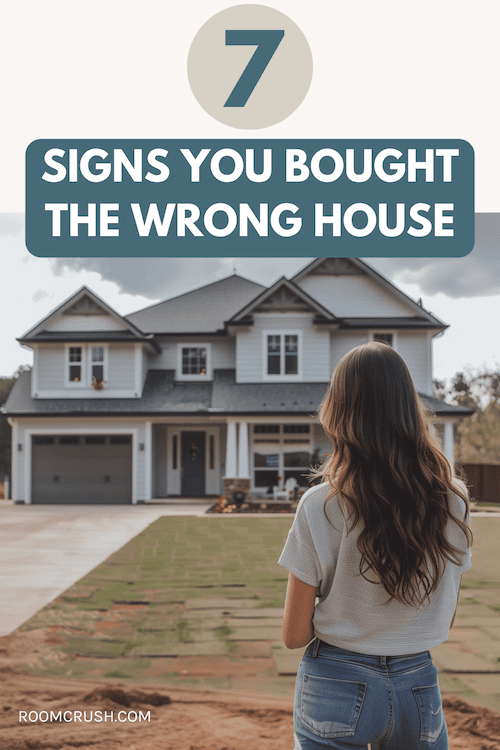
4. Mortgage Payment Too High
If you find after moving in that your mortgage payment is higher than you thought, there are ways to fix this problem. First, you can cut back in any way you can and keep a strict budget so you can afford the payment.
Another good suggestion is to start a side hustle to help you afford the home. If you find that the mortgage is too much, try a combination of extra jobs and budgeting until you can sell the house without penalty and buy something cheaper.
You could even consider renting out rooms in your home on places like VRBO if that sounds like a safe option for you.
Or, if you love the house and don’t want to sell, consider looking for a higher-paying job or trying to ramp up your side hustle as much as possible. These things can give you the opportunity to live in the house that you love and afford it.
5. House Just Doesn’t Meet the Needs of Everyone in the Family
It’s difficult to imagine yourself living somewhere without actually doing so. You could find out when you move into your new home that it doesn’t exactly work for your family.
Perhaps the house is too small and cramped for everyone. Or maybe your family is small, and the home feels too large.
You may also find that the schools aren’t a good fit for your kids. Many things can make the house feel like it isn’t right. If so, you can try to make some changes or sell the home at a later date.
6. Homeowner’s Association is Too Strict
Although having an HOA does help the neighborhood to look nice, it can also be expensive and restrictive. Some HOA’s have many rules about what you can and can’t do, and it can be annoying at best and exhausting at worst.
If this happens, you might try attending board meetings or seeking to change the rules. Or maybe your HOA has exceptionally high fees.
If so, you can try to get them reduced. If that doesn’t work, moving may be a better solution.
7. Relationship Issues
Sometimes the problem with a new house isn’t the house. Divorce or separation can significantly change your housing needs.
You may suddenly find that you need less space than you did before. If this is the case, you may need to sell or discuss with your former partner how best to proceed.
Can I Get Out of a House I Just Bought?
There are some circumstances where you can back out of buying a home, but the chances are, it’s going to cost some money, so be sure that’s what you want.
If your contract has contingencies, there may be some ways to get out of buying the house. Inspections of houses that turn up serious problems are one well-known contingency.
There are other contingencies, too. If you just agreed to buy a home and now want to back out, check if a contingency applies to your situation.
What to Do When You Hate the House You Just Bought?
Perhaps no contingencies apply, but you dislike the home purchase you just made. How do you handle living somewhere less than ideal?
The easiest thing to do is try to improve the problems. Sounds easier said than done but if it works out, it’ll save you the most amount of money.
Can You Improve the Problems?
If it will cost too much or you can’t get out of the house you just bought, try to improve your situation. Think about it creatively and decide if the issues are things you can deal with or things that can be made better.
For example, suppose the neighbors turn out to be awful. In that case, you might try communicating with them or setting up a fence to increase privacy and avoid disputes.
Or if the house has problems with things breaking, find out if the previous owner is obligated to pay for any of it, or think through how to afford the repairs yourself.
Most situations can be improved with a bit of creative thinking and communication. Try to work through your home situation in these ways and see if you can make improvements.
Can You Sell a Home Right After You Buy It?
Maybe you’ve tried to improve the situation and have found that the best thing to do is sell and move somewhere new. In that case, can you sell a house you just bought?
The answer is a little complicated. The first thing to know is you are able to sell your house any time you want. But some other factors may have you questioning whether or not you should.
Consider Tax Implications
You might not make any money from selling if you do so too quickly. Typically, short-term capital gains taxes apply if you immediately sell a home you just bought in less than a year.
With this factor, selling can quickly become expensive. Speak with your tax specialist to see if this will apply to you.
Best Timing for Market
Before selling, you should also consider whether the market is favorable for sellers. House prices can fluctuate depending on many factors.
So if the home will sell for less than you bought it for, you may want to reconsider or wait until the market is better.
Transaction/ Realtor Fees Could Make it Expensive
Selling a home can be expensive. Prices for realty fees typically fall in the range of 4-6% of the selling price.
There may also be closing costs involved. All these fees can add up quickly.
Plus, you just bought the home and paid all the expenses for that, so the chances are your funds aren’t the highest they’ve ever been. The costs are enough to make anyone pause on selling a home they just bought.
Even if Your New Home is Not Ideal, You Have Options
Buying a house takes time and money. And it can be disappointing and financially straining when you realize that purchasing your home may have been a mistake.
Even if you start to notice signs you bought the wrong house, the good news is, you still have options. It’s possible you can back out of buying the home, or if not, you can try to improve the situation.
Remember that while a house is a large purchase, it doesn’t have to be permanent, and things can get better.
Related Articles:



